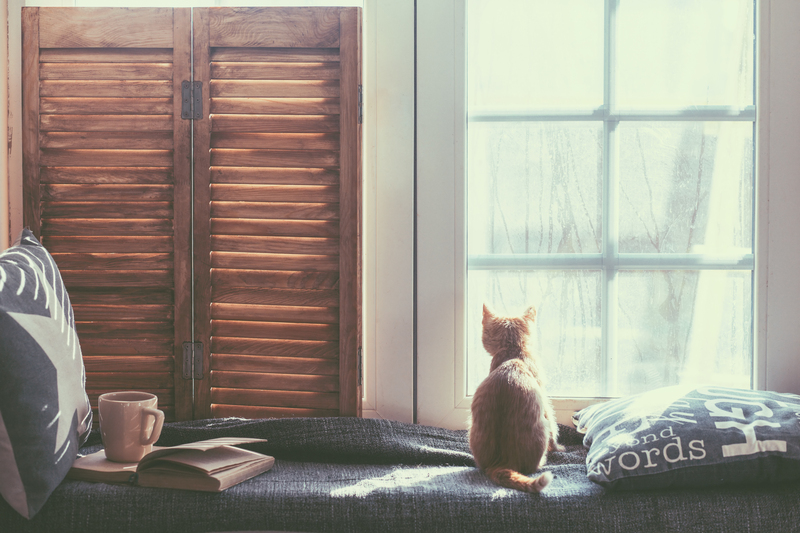Discover the Calming Effects of a Clutter-Free Environment
Living in a world that rarely slows down can make it challenging to keep chaos at bay, especially within our own homes and workplaces. Yet, it's in these very spaces that the calming effects of a clutter-free environment become invaluable. Embracing organization can play a significant role in enhancing our mental, emotional, and even physical well-being. In this comprehensive guide, we will explore the holistic benefits of minimizing clutter, practical steps for maintaining tidy spaces, and how you can transform your surroundings into harbors of tranquility.

Why Does Clutter Cause Stress?
Before delving into the benefits of a clutter-free environment, it's important to understand why clutter impacts us so profoundly. Research has shown that clutter can increase levels of stress hormones, making us feel overwhelmed and anxious. Here are key reasons clutter contributes to stress:
- Visual Overstimulation: Messy environments demand constant attention from our brains. Every out-of-place item sends signals, overloading our sensory processing systems.
- Distraction from Tasks: When disorganization surrounds us, it becomes harder to focus on what truly matters, affecting productivity and efficiency.
- Sense of Failure: Piles of clutter can lead to feelings of guilt or embarrassment, undermining self-confidence and motivation.
- Wasted Time: Searching for misplaced items costs valuable time and can lead to increased frustration.
By minimizing clutter, you create the foundation for a peaceful, restorative sanctuary. *But how exactly does this transformation occur?* Let's find out.
The Psychological Benefits of a Clean and Organized Space
1. Reduced Stress & Anxiety
A tidy environment eases the mind by reducing sources of anxiety. Studies indicate that people with less clutter experience lower levels of cortisol, the primary stress hormone. When spaces are organized, your brain is not constantly processing excess stimuli, allowing mental energy to be directed to more fulfilling tasks or simply to relax.
2. Improved Focus & Productivity
A workspace free of clutter helps eliminate distractions, enabling better concentration. Whether at home or in an office, a clean desk supports clearer thinking and boosts productivity. Organized environments foster creativity and allow you to approach challenges with a fresh, uncluttered perspective.
3. Enhanced Mood & Well-being
Maintaining a clutter-free living space can significantly improve your mood. The process of decluttering, in itself, releases endorphins--our body's "feel good" chemicals. Coming home to an orderly space fosters a sense of calm, safety, and satisfaction, contributing to overall happiness.
4. Better Sleep Quality
Your sleeping environment greatly impacts sleep quality. Clutter can create a sense of chaos in the bedroom, making it harder for the mind to unwind. By stripping away excess belongings, you signal to your brain that it's time to rest, thus improving the quality and duration of your sleep.
Physical Health Benefits of a Clutter-Free Lifestyle
Not only does an organized environment support mental health, but it also has tangible effects on physical well-being. Here's how:
- Less Dust and Allergens: Items left to gather dust can become breeding grounds for allergens. Fewer objects mean easier cleaning, leading to better air quality.
- Reduced Accidents: Clutter, especially on floors and in walkways, increases the risk of trips and falls. A tidy space is inherently safer for everyone.
- Encourages Healthy Habits: Clean kitchens make it more inviting to cook fresh meals, while organized workout spaces can inspire regular exercise.
How to Achieve a Clutter-Free Haven
Transitioning to a minimalist environment might appear daunting, but breaking the process into manageable steps makes it achievable and even enjoyable. Follow these evidence-based strategies for ongoing clarity and calm:
1. Start Small & Prioritize
Don't attempt to overhaul your entire home in a day. Begin with a single area, such as a desk, nightstand, or entryway. Prioritize spaces that impact your daily routines and mental state the most.
2. Sort & Simplify
- Declutter by Category: Instead of moving room by room, sort items by category: clothing, books, paperwork, sentimental objects, and miscellaneous.
- Use the Four-Box Method: Have boxes or bins labeled as 'Keep,' 'Donate,' 'Sell,' and 'Trash' to streamline decisions.
- Ask Key Questions: Do I use this regularly? Does it add value or bring me joy? If not, let it go.
3. Organize Intentionally
- Designate Spaces: Assign a specific home for each item to prevent future clutter from building up.
- Embrace Vertical Storage: Use shelves and hooks to maximize space and keep surfaces clear.
- Label Clearly: For shared or high-traffic areas, labels ensure everyone knows where things belong.
4. Adopt Daily Maintenance Habits
- One In, One Out Rule: Every time a new item enters your home, let something go to maintain balance.
- Evening Refresher: Spend five minutes at the end of each day returning things to their places.
- Regular Review: Schedule monthly or seasonal decluttering sessions to keep spaces in check.
The Role of Minimalism and Mindfulness in Creating a Calm Environment
Minimalism is about more than just reducing possessions; it's about making mindful choices that focus on quality over quantity. By choosing to live with less, you make room for what truly matters--whether it's meaningful relationships, personal development, or simply peace of mind.
Applying mindfulness to your living or workspace means being present and intentional with your surroundings. Notice how each element in your environment affects your mood and concentration. Curate your space so that every item serves a purpose or brings genuine joy. This mindful practice helps create a sustainable, clutter-free lifestyle that's uniquely tailored to your values.
Clutter-Free Spaces: Tips for Every Room
1. Living Room
- Limit decorative items to a few favorites.
- Use baskets or hidden storage to keep remotes, magazines, and toys organized.
- Regularly recycle or donate books, DVDs, and games no longer in use.
2. Kitchen
- Keep countertops clear--store small appliances you rarely use.
- Sort pantry items, tossing expired goods and consolidating duplicates.
- Designate a drawer or section for utensils and food storage containers.
3. Bedroom
- Restrict bedside tables to essentials: a lamp, book, or journal.
- Rotate seasonal clothing, storing out-of-season items out of sight.
- Utilize under-bed storage for linens or rarely-used items.
4. Workspace or Home Office
- Limit your desktop to your computer and a few tools for daily work.
- Implement vertical file systems and digitalize paperwork.
- End each workday by tidying up and preparing for a fresh start.
Maintaining Motivation: The Emotional Rewards of Decluttering
Decluttering isn't just about aesthetics; it's a transformative process that delivers lasting emotional rewards. Here's what you can expect:
- A Sense of Accomplishment: Completing a decluttering project, no matter how small, provides a motivational boost and fuels further positive action.
- Increased Confidence: Taking control over your environment can restore a sense of agency and self-efficacy.
- Improved Relationships: Living in harmonious, clutter-free surroundings reduces conflict and fosters better communication, especially in shared spaces.
Remember, every step toward a tidier, more intentional environment is a step toward a calmer, more centered you. Celebrate each milestone--even incremental progress is worth recognizing.
Overcoming Challenges: When Decluttering Feels Overwhelming
It's common to feel emotionally attached to belongings or daunted by the decluttering process. To help, consider these strategies:
- Invite Support: Enlist a trusted friend or professional organizer for encouragement and accountability.
- Break Tasks Down: Set a timer for 15-30 minutes and focus on one small area at a time.
- Visualize the Benefits: Keep your eye on the prize by envisioning the calm, inviting environment you're working toward.
- Practice Self-Compassion: Let go of perfectionism; progress, not perfection, is key.

Frequently Asked Questions About the Calm Benefits of Decluttering
How often should I declutter?
Regular small reviews--monthly or seasonally--are ideal for preventing overwhelm. Investing a few minutes daily will keep clutter at bay and ensure your environment remains a source of peace.
What if family members are resistant to letting go of things?
Lead by example, gently communicate the benefits, and establish communal spaces where organization is non-negotiable. For personal items, respect their choices and allow individuals to move at their own pace.
Can a clutter-free environment help with focus issues?
Absolutely! Many people with attention or executive functioning challenges find that order and simplicity in their surroundings significantly boost concentration and productivity.
Conclusion: Embrace Serenity by Creating Your Own Clutter-Free Refuge
From sharper mental clarity and increased happiness to physical well-being, the calming effects of a clutter-free environment are far-reaching. By prioritizing simplicity and intentional living, you can transform your home or workspace into a true sanctuary--one that energizes, inspires, and rejuvenates. Start small, stay consistent, and remember: a peaceful environment is one of the greatest gifts you can give yourself.
Explore today the calming, transformative power of a clutter-free life--and enjoy each moment of tranquility that follows.